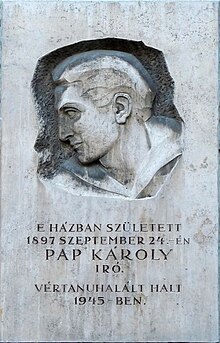Károly Pap
Károly Pap [ ˈkaːroj pɒp ] (born September 24, 1897 in Sopron , † after January 31, 1945 in Bergen-Belsen (uncertain)) was a Hungarian writer.
Life
Károly Pap was born in Sopron in 1897 as the third son of Rabbi Miksa Pollák (1868–1944). When the First World War broke out , he volunteered for military service. At the time of the Soviet Republic of Béla Kuns (1919) he belonged to the Hungarian "Red Army" and was therefore briefly imprisoned from 1920 to 1921. After his release, he tried his luck abroad (including Austria ). Back in Hungary, he lived off doing odd jobs ; so he worked, among other things, as a coffin maker and actor. His first published story appeared in the Budapest newspaper Pesti Napló in 1923 . With further stories Pap gained a certain degree of popularity in Hungary in the following years, but he could not live from his writing. His wife, Hedvig Solymosi, whom he married in 1927, earned his living. In 1937 his most successful novel Azarel was published . During the Second World War , the National Hungarian-Jewish Educational Association (OMIKE) premiered two plays with Old Testament themes that it had written . In 1944 Károly Pap was deported to Buchenwald and murdered there or in Bergen-Belsen in 1945.
plant
Károly Pap's first novel Megszabadítottál a haláltól ("You have set me free from death", 1932), published during his lifetime, projects conflicts in Judaism back to the time of Jesus Christ . In The Eighth Station , Pap reflects on the position of the artist and the importance of art in society.
"Azarel"
The novel "Azarel" tells of the childhood of the son of a progressive rabbi, Gyuri Azarel, from his perspective. Promised by his parents to his devout grandfather even before he was born, Gyuri spent his early childhood years apart from his family with the old man, who decided to deal with the sins of his children (for him this also includes the reform rabbinism of Gyuri's father) to atone through a particularly simple life full of privation, and therefore believes that one can also make the highest demands on others, whether human or God. After his death, Gyuri has to settle into the prosaic world of life and spirit of his parents and his two siblings, which is determined by thrift, reason and modesty, but he is unwilling to respect the conventional, socially sanctioned boundaries between fiction and reality. The crisis comes when Gyuri expresses his doubts about God and, being beaten by his father, accuses his parents of mendacity and selfishness. Gyuri runs away and lives as a beggar for a day, but when he tries to "expose" his father in the synagogue in front of the assembled congregation, he passes out and has a fever for two days. In his recovery, his father asks him to "see everything as illness" and forget it. But the conflict with the double standards of the environment is not resolved; Gyuri knows that the others would not have treated him as well as a beggar as they did as a rabbi. The novel ends with Gyuri's attempts to process the events literarily.
The text is characterized by recourse to motifs from folk tales and the Tanakh , which, as it were, are typologically transferred to Gyuri's life.
Works
- Mikáél (1929)
- Megszabadítottál a haláltól ("You set me free from death", novel) 1932
- A VIII. Stáció (novel) 1933, German: The eighth station. Translated from the Hungarian by Dorothea Koriath . Berlin: Union Verlag 1988, ISBN 3-372-00107-9
- Zsidó sebek és bűnök ("Jewish wounds and sins", essay ) 1935
- Irgalom ("Mercy", short stories ) 1937
- Azarel (Roman) 1937, German: Azarel. Translated from the Hungarian by Hans Skirecki . Munich 2004, ISBN 3-630-87157-7
- Betséba ("Bathsheba", drama) 1940
- Mózes ("Moses", drama) 1944
- A szűziesség fátylai ("The veil of virginity", short stories) 1945
- A hószobor ("The Snow Figure ", short stories) 1954
- Szerencse ("Luck", short stories) 1957
- B. városában történt ("It happened in B's city", short stories) 1964
literature
- János Kőbányai: Károly Pap and Azarel . In: Károly Pap: Azarel. Translated from the Hungarian by Hans Skirecki . Munich 2004, pp. 290-304
Web links
- Literature by and about Károly Pap in the catalog of the German National Library
- www.hunlit.hu
- Review of the German edition of Azarel
- Article in the Jewish Virtual Library (Engl.)
Individual evidence
| personal data | |
|---|---|
| SURNAME | Pap, Károly |
| BRIEF DESCRIPTION | Hungarian writer |
| DATE OF BIRTH | September 24, 1897 |
| PLACE OF BIRTH | Sopron |
| DATE OF DEATH | after January 31, 1945 |
| Place of death | unsure: Bergen-Belsen |

